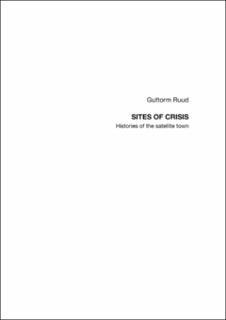| dc.contributor.author | Ruud, Guttorm | |
| dc.date.accessioned | 2021-01-29T12:30:34Z | |
| dc.date.available | 2021-01-29T12:30:34Z | |
| dc.date.issued | 2021 | |
| dc.identifier.isbn | 978-82-547-0339-7 | |
| dc.identifier.issn | 1502-217X | |
| dc.identifier.uri | https://hdl.handle.net/11250/2725351 | |
| dc.description.abstract | This thesis is a history of the relationship between the satellite town and the welfare state analysed through the prism of crisis. Extending the architectural historian Manfredo Tafuri’s concept of history as a project of crisis, the thesis is a critique of historical perspectives that legitimise present development by constructing modernity in terms of ‘progress’. The thesis examines the discourse of satellite town development and crisis by analysing the critique of Oslo’s satellite towns and the Norwegian welfare state as it emerged in reports and mass media between 1969 and 1976. Employing three analytical devices – which combine the welfare state actors of state, capital and civil society with the satellite town functions of housing, centre and neighbourhood – the study refracts the history of the satellite town and the welfare state to reveal how it is the product of disparate conflicts and struggles. The thesis contributes to the theoretical understandings of the welfare state and welfare capitalism. It adds to the existing literature on the relationship between architecture and the welfare state and the literature on satellite towns and new towns, as well as national and Nordic literature on the history of city planning. | en_US |
| dc.language.iso | eng | en_US |
| dc.publisher | The Oslo School of Architecture and Design | en_US |
| dc.relation.ispartofseries | CON-TEXT. PhD thesis;107 | |
| dc.title | Sites of crisis : histories of the satellite town | en_US |
| dc.type | Doctoral thesis | en_US |
| dc.description.version | publishedVersion | en_US |
| dc.rights.holder | Guttorm Ruud | |
| dc.source.pagenumber | V, 257 s. | en_US |


